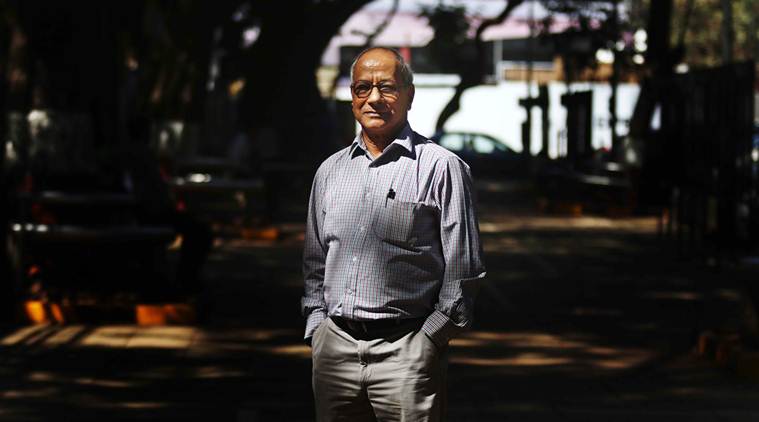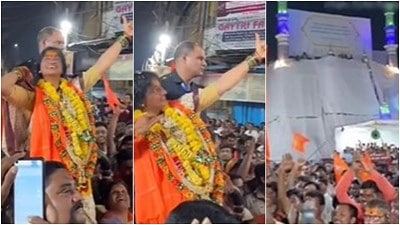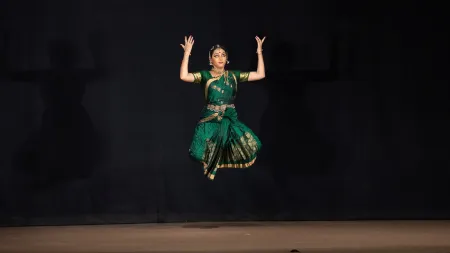- India
- International
‘Technology is erasing history. Only literature can counter that’
Contemporary Hindi poet Manglesh Dabral on aggressive nationalism, returning the Sahitya Akademi award last year, and his altered relationship with his hometown in Tehri Garhwal.
 A shout from the void: Manglesh Dabral. (Source: Express photo by Prashant Nadkar)
A shout from the void: Manglesh Dabral. (Source: Express photo by Prashant Nadkar)
A former journalist, Manglesh Dabral is considered among India’s foremost Hindi contemporary poets alongside Uday Prakash and Vinod Kumar Shukla. The 68-year-old, who received the Sahitya Akademi in 2000 for Hum Jo Dekhte Hain, was recently in Mumbai for the Poets Translating Poets festival.
Excerpts from an interview:
Your latest poem, Shabdkosh, which you read out as part of Poets Translating Poets last week, points out how words are losing their meaning but, essentially, it mirrors the changing times.
It’s a fast-changing world where we no longer mean what we say. For instance, ‘love’ is devoid of emotion. We no longer term an atrocity as an atrocity. ‘Terror’ is more terrifying, and there is more fear in ‘fear’. When a powerful figure speaks of ‘a new dawn’, it probably means darkness is nigh. Yes, the poem speaks of the current mood in India.
You have been vocal in your criticism of the government, and the climate of intolerance. You also returned your Sahitya Akademi last year, along with several other writers and artistes.
I have always been against the idea of a totalitarian government and that comes through my works from years ago. Tanashahi (2014) was inspired by our Prime Minister Narendra Modi’s style of giving speeches. His clothing inspired another poem, Folk Tale. In it, a king of a fictional land is known to do things in the right manner, and he says he doesn’t like muck of any kind. He is particular about what he wears and changes his clothes often, sometimes twice or thrice a day, because he feels his clothes have a stain. And when his reign eventually ends, his clothes go down in history. His era is remembered as the time of dirty and stained clothes.
You have closely experienced Emergency as a journalist. How do you look back at the time?
It was a very dark period, yes. It was clear that if you wrote against the state, it will punish you, even jail you. What sets it apart from the current time is the uncertainty. Will you be jailed, shot or be branded an anti-national? People cannot even speak against demonetisation. Writer UR Ananthamurthy, a prominent cultural figure, was threatened by Modi supporters and asked to go to Pakistan when he criticised him.
Do you think artistes returning the awards last year made an impact?
I was attending a TV debate after I returned my award when, outside the studio, some RSS members told me that the bad press BJP received due to my “ilk” had caused the party to lose the Bihar elections. I told them they are overestimating our power. But if what they said is true, I am happy.

In this age of aggressive nationalism, we are witnessing the re-emergence of the call for ‘Hindi, Hindu, Hindustan’. Names like Pratap Narain Mishra are being used to bolster the case.
‘Hindi, Hindu, Hindustan’ was Mishra’s creation for the Bhartiya Hindu Mandal. But that’s a different debate. They wanted a renaissance of the Hindi belt to counter Urdu; they had a love-hate relationship with the British. But it didn’t become a movement. What we see now with the emergence of communal and ultra-national forces is an attempt at Hinduisation. It’s an alarm bell and we need to hear it. Only the Dalit, Adivasi and women’s movements provide hopes of countering it.
Your poetry is often political, and consumerism is a running theme.
I am against consumerism and technology. I don’t oppose technology but its greatest repercussion has been on memory. Memory is crucial for imagination, and technology and consumerism destroy it. How many people remember what mobile phone they were using two years ago, or what clothes they bought last year? Along with memory, even history is being erased by technology and, perhaps, only language and literature can counter that.
How does memory aid imagination?
Don’t confuse memory with nostalgia. Let me explain through a poem that Vishnu Khare wrote about Mayur Vihar, a neighbourhood in east Delhi. In the poem, he says he hears peacocks cry in the mornings. This is fictional but is based on his memory of the place. Mayur Vihar was once a jungle and peacocks would live there. In his poem, they visit in search of their old habitat.
You don’t shy away from using English words in your poetry.
Some words, such as internet or mobile phones, are tough to translate in Hindi while maintaining a connect with the reader. That said, I am not a linguistic puritan. It’s only through intermingling that languages can grow richer.
Your early years in Kaphalpani in Tehri Garhwal have deeply influenced your poetry, and they feature in it. The place has, since, changed. You have moved away too. Has that changed your relationship with your hometown?
I go to Kaphalpani once a year or so. But there is a difference between visiting home and returning. The latter doesn’t happen anymore. But I don’t grudge cities. Kehte hain gaon ki galiyan gaon mein ghoomti hain, sheher ki galiyaan baahar le jaate hain (Village life is confining, whereas cities lead one to discover and evolve). If you look at history, all civilisations have emerged out of cities, including the Indus Valley Civilisation.
Does dispossession, which you often address in your poems, then, stem from your experience of having lived in the hills and seen the life there transform?
My hometown and its neighbourhood have witnessed large-scale dispossession and displacement. The first migration took place in 1911. A man called Gabbar Singh Negi walked for two days to Lansdowne, an army recruitment centre. He was sent to France by the Britishers, where he died in 1913. We have seen major displacements since. Of the 12,500 villages, 2,500 are empty. People have abandoned farming or have been displaced due to infrastructural projects. Three generations on, these people will forget their language and roots.
What makes it important to be rooted?
Ritwik Ghatak used to say that everyone should keep a piece of their childhood in their pocket. The idea of ‘home’ is important to us all. Poet Alok Dhanwa aptly says that there’s no charm left in India. Today, we live in the country like it’s a refugee camp.
More Lifestyle
Apr 19: Latest News
- 01
- 02
- 03
- 04
- 05


































